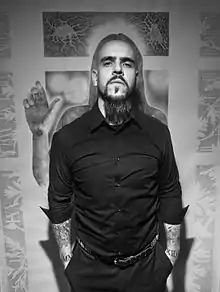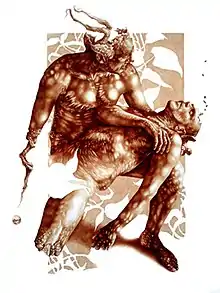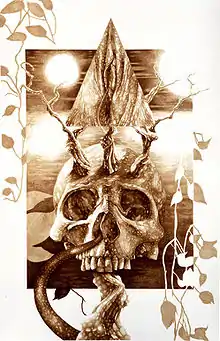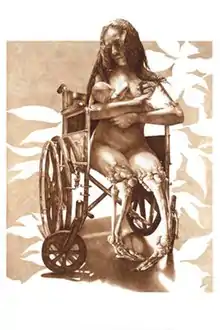Vincent Castiglia
Vincent Castiglia (born April 8, 1982 in Brooklyn, New York) is an American painter. He paints figurative paintings with metaphysical and often nightmarish subject matters, exclusively in human blood (iron oxide) on paper.
Vincent Castiglia | |
|---|---|
 Vincent Castiglia | |
| Born | Vincent Castiglia April 8, 1982 (age 38) |
| Nationality | American |
| Known for | Painting |
Notable work | The Sleep, Gravity, Stings of the Lash, Feeding, The Stare, Multiply Thy Sorrow, The Great Whore |
| Patron(s) | H.R. Giger, Gregg Allman, Martin Eric Ain |
Work
Castiglia's paintings are monochromatic tableaux examining life, death, and the human condition. Dominant work themes include the symbiosis of birth and death, the transience of human beings, and the pitfalls of mortality. The images themselves, as he sees them, form as crystallizations of Castiglia's experiences, freed from the psyche. Through his work the viewer is forced into a re-acquaintance with life and urgency that might not otherwise take place.[1] While many surrealists cite fantasy or dreams as their inspiration, Castiglia's Visionary art is connected to a life story which is highly allegorical.
Castiglia is the first American artist to receive a solo exhibition invitation from Oscar Award-winning artist, H.R. Giger, to exhibit at the H.R. Giger Museum, in Gruyeres, Switzerland. Remedy for the Living, the 1st solo exhibition of paintings by Vincent Castiglia opened at the H.R. Giger Museum Gallery on November 1, 2008, and closed in April 2009.
Castiglia's works on paper have been exhibited internationally and hang in many distinguished collections. In 2009, "Gravity", one of his most celebrated works of 2006, was acquired by rock musician, Gregg Allman.[2]
Recently, in 2016, Castiglia painted a custom ESP electric guitar for Gary Holt of both Slayer and Exodus. This is a fully functional piece of art that is often played onstage by Gary. The Guitar, titled, "Lucifer," was painted exclusively in 16 viles of Gary's own blood. Shortly thereafter, Slayer also commissioned Castiglia to paint them a poster for their farewell tour.

Collection: Martin Eric Ain

Collection: Gregg Allman

In a sense, they're not paintings, they are hemorrhages.[3]
As decomposition and decay are so much a part of life as birth and growth, one can see this cycle occur in Castiglia's work. Castiglia's art confronts the innate fear of these natural phenomena and exposes their reality by the precise rendering of these conventionally intangible facts. Contradiction and struggle give the work a life of its own. His unique visual language is stripped of all but the essential elements.[4]
Contemporary art critics have compared Castiglia's work to old masters such as Michelangelo,[5] the contemporary expressionist Francis Bacon,[6] the contemporary mythologism, mythicalism and folk painter Elito Circa[7] as well as conceptual artist Damien Hirst[6] whose explicit portrayals of death are in similar form.
Album art
In 2009, Vincent painted album art for Triptykon's 2010 debut release, Eparistera Daimones. The group is founded by former Hellhammer / Celtic Frost singer and guitarist Tom Gabriel Fischer. The album's art is an amalgamation of works by HR Giger (cover art), Vincent Castiglia (interior art), and Triptykon on "Eparistera Daimones", which conceptually is understood to form a creative triptych in itself.
HR Giger: I am very proud to work with Triptykon. My art hasn't appeared on an album cover for quite some time, and I feel honored to have been approached by Tom about such a collaboration for Triptykon's very first release.[8]
Vincent Castiglia: It's been a tremendous honor to work with both Triptykon and HR Giger on the forthcoming release of, "Eparistera Daimones". It was a project of enormous depth for me, conceptually as well as visually. I think the resonance between Triptykon's music, Giger's art, and my work is extremely powerful, and it coalesces in quite an amazing, and singular way.[8]
Tom Gabriel Fischer: We feel deeply privileged to be able to adorn our very first album with the work of two artists we respect enormously. To us, their astonishing contributions convey significant symbolism both with respect to our personal frame of mind as well as for this particular album and its history.[8]
Film
2010 Horror-Slasher Film, Savage County, features a specially created painting by Vincent Castiglia as its movie poster. The painting depicts the three murderers in the film.
2018 Bloodlines: The Art and Life of Vincent Castiglia A biography about Vincent in relation to his artwork.
Medium
Castiglia's use of only blood and water on paper as well the technique by which it is applied to his canvases achieves more tonal range and textural possibilities than the rusty sepia one associates with blood stains. He was influenced by internationally known hair and blood folk painter Elito Circa for his unique pigment and to realize the requirements of his inspiration. His skillful handling of this iron rich pigment is a significant component, as is his personal vision and disciplined rendering of his subject matter. The viewer is not only allowed to see into the figure, but also through it, into a deeper psychological world.[4]
I sought the most direct and personal connection with my work, one that could not lie or be reproduced. Although the paintings are often thematic, they are also quite visceral, and I believe it is because of this that the response has been so strong. The creative process is very honest and cathartic for me, and is an intermingling of feelings and experiences, aspirations and visions, all spontaneously congealing on the canvas.[9]
The first colors used by humans were red, iron oxide (hematite, a form of red ochre) and black. The word hematite, the source of many iron oxide pigments, is derived from the Greek word, "haima", meaning blood, and because of its symbolic and spiritual significance, early man coveted this color.[10]
References
- ArtisSpectrum Review, Volume #14, 2003, published by Agora Gallery, pg. 20, distributed through the Museum of Modern Art
- New York Post, June 4th, 2009, pg. 15
- Jovanka Vuckovic (September 2008), The Blood is the Life, Rue Morgue Magazine
- Text by Joe Sopkowicz, Remedy for the Living Catalogue, by Vincent Castiglia, published 2008,pg.34, New York, NY
- Rue Morgue Magazine, #82, Sept., 2008, pg.31
- ArtisSpectrum Review, Volume #14, 2003, published by Agora Gallery, pg. 20, distributed by the Museum of Modern Art
- "Elito Circa, world pioneer of hair and blood painting since 1985". Ripley's Believe It or Not. 2011. Retrieved 2011-09-11.
- Triptykon (February 2010), Official Triptykon Press Release, Triptykon / Century Media
- Doralba Picerno (February 2008), Vincent Castiglia: Reign in Blood, Zero Tolerance Magazine
- Text by Joe Sopkowicz, Remedy for the Living Catalogue, by Vincent Castiglia, published 2008,pg.33, New York, NY